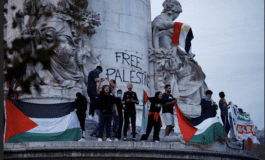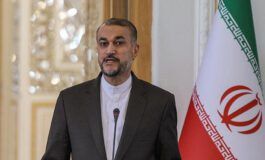This past week marked the fourth anniversary of the death of Yasser Arafat. We reprint here a tribute to the Palestinian leader.

|
|
The late Palestinian leader Yasser Arafat after failed peace talks in 2000. |
While the dream eluded him, Arafat was still looked upon as “father of the nation,” a man who had almost single-handedly put Palestine back on the world stage when the very name Palestine had been practically obliterated from the history books and maps, and its people had been deemed non-existent. Naturally, as one would expect after fifty years of controversial public life, there are those who love him and those who hate him, the praise and the slander each creating their own version of the man. Some criticisms are valid: most have been manufactured. Yet, Arafat managed to keep his head above the madding crowd, determined always to bring his people home from the wilderness.
Like all liberation leaders, Yasser Arafat had to struggle against the tide of influential powers, and even world opinion, but none were ever in Arafat’s precarious position – pitted against a powerful enemy, surrounded by ambitious Arab leaders from neighboring countries, thwarted by an interfering Western world, unable to operate from within his own country, without a well-equipped army, his people dispersed throughout the world, and internationally unrecognized. Against such overwhelming odds, Arafat continually had to navigate the shifting sands of intrigue and sabotage, and he made mistakes. But, as the late eminent Palestinian doctor, Haidar abd-al-Shafi pointed out “Whenever the need arose to make a courageous decision, all the others disappeared and Arafat was left alone. He was the only one who had the courage to decide.”

|
|
A Palestinian holds a poster depicting late Palestinian leader Yasser Arafat during a rally in the West Bank city of Ramallah marking the 4th anniversary of Arafat’s death, November 11, 2008. REUTERS/Fadi Arouri |
When Arafat was born, sometime in August, 1929, his destiny was fated to be burdensome. His birth name alone carried the weight of family pedigree – Mohammed Abdel-Raouf Arafat Al-Qudwa al-Husseini. His birthplace, often disputed – Cairo or Jerusalem – saw him move from one city to the other so much so that either could just as well have been his home. Perhaps some foresaw his future and determined to call him Yasser meaning easy, but there was nothing easy in the path he chose whilst studying engineering at Cairo University. It was there that he became actively involved with the politics of Palestine, and by 1958, he and some friends had founded Al-Fatah, an underground network of secret cells, which then produced a magazine advocating armed resistance against Israel. Al-Fatah was not recognized by the Arab states because Syria, Jordan and Egypt had formed their own group called the Palestine Liberation Organization (PLO) in a bid to control a political imbroglio fomenting within their midst. However, the humiliating defeat of the Arab States in the 1967 war — having lost the Gaza Strip, the Golan Heights and the West Bank — saw Arafat’s Fatah movement rise to prominence due to Arafat’s guerrilla tactics which had achieved a considerable measure of success against Israel. This was a turning point for Arafat. He realized that if the Palestinians were ever to succeed, they could only rely on themselves, and in 1968, thousands of Palestinians had joined the ranks of Fatah, hailing Arafat as their hero and their leader. It was natural that Arafat should take on the mantle of Chairman of the PLO after the Arab losses, although his guerrilla attacks against Israel worried the leaders of some Arab countries because they preferred a more conciliatory approach, which would primarily benefit them. Not long after, Jordan expelled him and his followers, accusing him of setting up “a state within a state.” For the next 25 years, he operated from inside Lebanon, then Tunis and Baghdad, before finally setting foot in Palestine. This added to the many difficulties Arafat faced in holding the liberation movement together. The fact that he managed this for the years he spent outside Palestine speaks volumes about his command and influence, and more importantly, his sensitivity to the nuances of all the different factions, passions, opinions, and pressures that surrounded him.

|
|
Israeli soldiers take positions against Palestinian stone-throwers during a rally in the West Bank city of Hebron marking the 4th anniversary of the death of Palestinian leader Yasser Arafat, November 11, 2008. According to an Israeli army spokesperson, two Palestinians taking part in the rally were arrested for throwing stones at Israeli forces. REUTERS/Nayef Hashlamoun |
For the next 14 years, Arafat worked with incredible patience, always sensitive to the passions arising from his people’s overwhelming pain. It was a slow process of dialogue and a gradual introduction of his ideas. But, in all that time, he never neglected to support the men who were still fighting in Lebanon. Both in 1982 and 1983, he stood with them against the Israeli General Ariel Sharon, who had invaded Lebanon to drive out the Palestinians and to kill him. Both times, Arafat left to fight another day, refusing to surrender. Those who fought with him will never forget his courage and that he, like them, was ready to die for the cause. As the 1987 intifada broke out, Arafat again began negotiations with Israel.
It was the following year that Arafat addressed the U.N. General Assembly in a remarkable speech, which not only defended the Palestinian position, but also accepted the need for compromise in the interests of peace. By agreeing to an international conference for peace based on U.N. Resolutions 242 and 338, Arafat de facto recognized Israel and the right of the two states to exist side by side. Until then, compromise had not been regarded as an option by a people cruelly dispossessed and still victims of Israel’s brutal occupation and oppression. That Arafat was able to bring about a paradigm shift in their thinking, whereby they accepted their enemy’s right to exist on 78% of the land stolen from them is extraordinary, and underlines Arafat’s credibility with his people. No one else could have turned the Palestinians around.
From then on, Arafat was involved in numerous peace negotiations with Israel, and the U.S. as broker. However, his decision to back Saddam Hussein in the Gulf War of 1991 threw the Palestinians back into the abyss. He paid a huge price for his loyalty to the one Arab leader who had supported the Palestinians. His decision rendered Arafat irrelevant as a negotiating partner, and from this position Arafat had the painful task of clambering out of the abyss to re-establish his and the PLO’s credibility and bring Palestine back into international focus.
In the meantime, bilateral talks held between Washington, Israel and a non-PLO delegation, had stalled, and the PLO entered into secret negotiations with Israel in Oslo. Arafat knew that concessions had to be made and so he made concessions — too many for some and fatal ones for others. Effectively, the arrangements gave Arafat limited self-rule in the West Bank and the Gaza Strip in exchange for Palestinian recognition of Israel. Arafat was expected to establish a police force to control internal security and leave external security to the Israelis. Other issues were to be negotiated at various stages over five years, the most difficult ones being left to “final status” talks. These arrangements meant that Arafat had finally abandoned his long held dream of a single secular democratic state in favor of the two state solution. In reaching such a compromise, Arafat had taken a political gamble knowing that some would see it as a sell-out in order to bring the PLO back in from the cold. Others were convinced that this shift was well worth the sacrifices the Palestinians would have to make individually and collectively. The negotiations culminated in the signing of the “Declaration of Principles” in 1993. With U.S. President Bill Clinton watching, Arafat shook hands with Israel’s Prime Minister Rabin and thereby sealed an interim agreement between the PLO and Israel of joint recognition.
For Palestinians around the world, it was a momentous occasion. Many saw it as the beginning of a new, although severely protracted, Palestine. Others were outraged. They felt Arafat had offered too much and consigned the Palestinians to Bantustans, effectively making a two state solution impossible. Nevertheless, in January 1996, Arafat was elected the first president of the Palestinian National Authority (PNA) overseeing the 88-seat Palestinian Legislative Council (PLC) governing the West Bank and Gaza Strip. It was a short-lived victory. Rabin was assassinated by an Israeli extremist and Israel’s Prime Minister Netanyahu, determined to undermine the Oslo process, refused to implement the first stages of the agreement.
The world had expected Arafat to become a statesman after the Oslo Accords, but Israel did not allow him the dignity of presiding over a state. Arafat had been simply relegated to the task of keeping the Palestinian population under control while Israel kept a vise-like grip on the provisional state’s borders, airspace and water, inevitably affecting its economic viability. Clearly, Israel had never intended to hand over territorial sovereignty.
It was another devastating blow to Arafat’s credibility. The Oslo Accords had not ended the occupation. Instead, the Palestinians found themselves facing an apartheid situation worse than anything endured by South Africa. The blanket closure of Palestinian civilian life, random attacks and relentless home demolitions rendering thousands homeless, while Israel continued to build settlements, soon caused some Palestinians to wonder what Arafat had actually achieved for them. Arafat, under an obligation to provide peace and security, saw his police force being decimated by Israeli targeted attacks and was then in the humiliating position of being unable to keep a lid on the explosive situation that was building daily.
Elusive peace
By July 2000, Arafat was being pressured to take part in “final status” talks hosted by U.S. President Clinton at Camp David. These talks were supposed to be the culmination of the phased Oslo peace process and were meant to resolve the most difficult issues of Jerusalem and the Palestinian refugees. Arafat had to walk away: he simply could not agree to Israel’s conditions. There was no choice. He either had to accept the Bantustans already proven so disastrous in Apartheid South Africa, back down on the inalienable right of return for the Palestinian refugees, and make impossible concessions on East Jerusalem, or accept the ugly consequences of refusing to negotiate “peace.” Prime Minister Barak’s “generous” offer was totally without substance: a threat rather than a proposal.
Arafat, of course, was the bête noire of the talks. We are never told that during those negotiations, Israel offered no detailed solution and nothing was in writing. Neither are we told that contrary to what had been agreed at Oslo, Barak continued to build settlements in the Occupied Territories. And, whatever support Arafat might have been able to garner from his people on some of the issues being negotiated, concessions on East Jerusalem as the capital of the Palestinian State, and the right of return for all Palestinian refugees, were simply non-negotiable. The irony of it all is that Israel was held up as offering something when in fact it was offering nothing, and Arafat emerged as the man who rejected peace. The Palestinian people despaired.
Arafat and Barak returned home to an enemy waiting in the wings. Sharon, Arafat’s arch-enemy, was about to make his entry on to the world stage. His provocative visit to the compound in Jerusalem called Haram al-Sharif by Muslims and Temple Mount by Jews with 1000 Israeli security forces was deliberately engineered to display Jewish sovereignty over the area, and when angry unarmed Palestinians began throwing stones at the police in riot gear, Sharon’s security forces retaliated with gunfire. People were killed and many were injured. The ugly clashes which ensued are often cited as the beginning of the Al Aqsa intifada and were clearly set off by Sharon’s provocative act and not Arafat’s so-called rejection of peace. No one was surprised that the peace process was effectively frozen when Barak lost the elections to Sharon. The war that had been unleashed on the Palestinians even before Camp David, now escalated ferociously. No matter how much Arafat condemned suicide bombings, Israel made sure that he was seen as tolerating, even encouraging the suicide bombers, which gave Sharon the necessary excuse to reject Arafat as a viable partner in any peace negotiations. This then led to a bizarre turn of events, whereby President Bush declared Sharon “a man of peace” even as Sharon was bulldozing his way through the territories and announcing that Arafat was a target for assassination. Arafat, the man who had shared the Nobel peace prize with Rabin and Peres, was now branded a terrorist and unfit to negotiate peace.
The world watched incredulously as Sharon declared an all-out war on Palestinians — on Ramallah, Jenin, Bethlehem, Nablus, Tulkarem, Qalqilya, and particularly, Arafat. More than 100 tanks rolled into Ramallah in April 2002 and began smashing Arafat’s headquarters leaving him besieged in a few rooms without electricity or water. For the next two and a half years, Arafat was a prisoner within his own walls and within his own land, while Sharon continued to blitz Palestinian cities and assassinate Palestinian leaders. The Palestinian Authority was all but dead and the Oslo Accords had foundered. Expecting Arafat to rein in the terrorists was a futile demand under the circumstances, but Arafat continued to issue one statement after another in Arabic calling for an end to violence and an end to suicide attacks. All to no avail. The people had suffered too much and without an effective police force, Arafat had no way of bringing law and order to civic life.
This time, however, Arafat refused to go into exile, preferring to stay with his people. If anyone knew Sharon, it was Arafat. He knew that Sharon wanted all of Palestine and would dismantle everything that had been gained through the Oslo Accords. Some were prepared to give Sharon the war he wanted. Arafat was not. He, therefore, had to find a way of becoming “relevant” again and in March 2003, Arafat agreed to political reforms and to share power with Mahmoud Abbas as prime minister. It opened the way for a “road map” for peace drawn up by the Quartet — the U.S., U.N., E.U., and Russia. But as before, neither Abbas nor Arafat were able to control the Palestinian militants, much less put an end to suicide bombings: the roadmap was leading nowhere.
With Arafat imprisoned in the muqa’ata, the road map deadlocked and Sharon on a rampage, the Palestinian situation escalated further. Arafat needed a miracle. He had fought countless adversities with enormous courage and determination, and had always emerged relatively unscathed. But, not this time. A mystery illness short-changed his life’s work. Perhaps the saddest moment in his long masterful career for those who watched was to see a frail old man waving feebly to his people, before being airlifted out of Palestine. It was too much of a miracle to hope that he would come back to lead his people again.
The wolves had been baying a long time and now they closed in. Much will be written and analyzed about Arafat and his deeds, but for the Palestinian people, Arafat will always remain a hero. Certainly, he made mistakes: he would not have been human otherwise. But he never deserved the vitriol and bile that have been heaped on him so cavalierly by his enemies and even Palestinians who comfortably criticize from afar. He deserved more. This small man, who was able to command the world stage for his beleaguered people, who could excite passions in men who served with him in the grimmest of battles, and who could to the last hold together the Palestinian factions, rivalries and differences inherent in any society, deserved to see the peace he sought and negotiated. He didn’t. However, he did see out the terms of nine U.S. presidents and eleven Israeli prime ministers and came closer to peace and the Palestinian dream than anyone had ever thought possible. He had tried everything and to the end kept the olive branch firmly in his grasp. Tragically, for all of us, it fell from his dying hand and the world lost the real peacemaker in the Middle East. There will be others who will carry the cause aloft for Palestine, but none who will ever symbolize the Palestinian struggle with all its pain, its momentary glory, its dashed hopes, and its eternal resilience, as potently or enduringly as Arafat. Four years since his untimely death, the Palestinians are no closer to the vision that Arafat held in 1988 in the hall of the U.N. General Assembly in Geneva. But he always had faith — the stuff of legends, unshakeable and uncompromised. The Palestinians need that faith more than ever today. This may well be the time to remember Arafat’s words: “Don’t forget Palestine.” g
Sonja Karkar is the founder and president of Women for Palestine in Melbourne, Australia and is also a founding member and co-convener of Australians for Palestine and editor of its website http://www.australiansforpalestine.com. This article was originally written at the time of Arafat’s death in 2004, and is being reprinted here with permission.





Leave a Reply